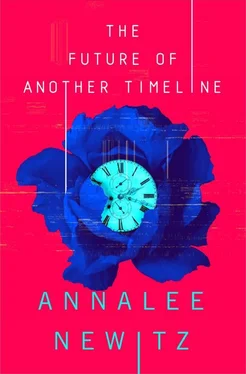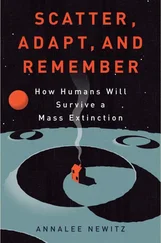I rolled my eyes. “Well, allow me to introduce you to the wonders of e-mail. I’m elizabethc@magma.ucla.edu.”
“Easy to remember. I’ll mail you some electrons!” He gave me a quick hug and raced off in the direction of the library.
I stood there for a moment thinking about the hug, and what I wanted it to mean. Then I took the long way back to the dorms, puzzling over my essay for Anita. By the time I got back to my room, I was still unsure what to write. I knew history could be changed, but none of the hypotheses fit my own experience. Why wasn’t there a scientific theory that described how we change our own lives and the lives of our friends?
Excerpted from the memoir of Anita Biswas, found in the Subalterns’ Archive Cave, Raqmu, Jordan (2030 C.E.)
There are some memories I will never share with the Daughters of Harriet, and this is one of them. I remember a nation without women’s suffrage. It’s where I grew up. As a little girl in Los Angeles in the 1970s, I was one of the lucky ones; Alta California gave us the vote a few years before I was born in 1968, and the UC system had been coed since the 1950s. When I was in middle school, my mother and I watched a soap opera called The Geologists every week because it had two African characters who traveled through the Machine at Timbuktu. Exposed to liberal ideas, treated to a college education, I had no doubt a woman like me could become a traveler. I landed a good position at Flin Flon. Then I spent my Long Four Years at a think tank called Past Engagements that provided evidence-based historical analysis to policymakers in Washington, D.C.
The first time I traveled, it was to Mississippi in the late 1860s. My assignment was simple: gather firsthand evidence for a lobbying group trying to prove that women’s suffrage movements are always doomed to fail.
My supervisor sent me to the period before the Fifteenth Amendment was ratified. This was during the bitter post–Civil War congressional debates over whether enfranchisement should extend to male former slaves, a subset of “educated” male former slaves, or both genders of all races. Conservatives were so angered by the process that they started defecting to the once-marginal Democratic Party, whose main platform was basically white nationalism. Lincoln’s Republicans were fearful of losing ground to Democrats in the South, so they hatched a desperate plan to make universal suffrage attractive to their dubious GOP brethren.
First, a group of Republican abolitionists persuaded the war hero and beloved cultural icon Harriet Tubman to run for U.S. Senator in Mississippi. Of course she couldn’t vote—and, therefore, couldn’t technically run for office. What she could do, however, was bring out huge crowds of women and ex-slaves at rallies and events where they filled out “provisional registration” forms as Republicans. The abolitionist Republicans were betting that activists in the South could get thousands of these people to fill out their forms. Behold: so many untapped voters, eager to toe the party line! It might persuade conservative members of the GOP to support universal suffrage. More Republican voters was a good thing, no matter how questionably human those voters might be.
I was the only Black person among the travelers at Past Engagements, so my supervisor decided I would be the ideal observer of this unique historical moment. “You’ll blend in. They’ll trust you,” he said. He didn’t understand that a mixed-race girl from California might have as little in common with a recently freed slave in Mississippi as he did. I couldn’t contradict him if I wanted this assignment, though, so I nodded and said nothing. Of course, I was right. During the six months I traveled, the activists kept asking me what I was. Sometimes the locals did too. Southerners were used to mixed-race people, because so many ex-slaves had white fathers, uncles, or grandfathers. But nobody had a father from India like I did.
I tagged along with a group of younger activists from New York, who treated me like their pet alien from the future. In late 1869 and early 1870, I took notes as they registered thousands of people in Mississippi, riding from town to town in a wagon with Harriet Tubman’s face painted on the side. Sadly, I did not get to meet the senatorial candidate herself; she was always campaigning or managing the elder care home for ex-slaves she’d founded outside Jackson.
The campaign was a spectacular failure. Men achieved universal suffrage, and women were sacrificed for the sake of Republican unity. A freedman named Hiram Revels won the Mississippi senate seat. Harriet Tubman went broke, and was forced to beg Congress for the soldier’s pension she hadn’t been granted previously because she was a woman. I returned to 1991 full of rage. We were so close to winning! Maybe if I’d participated, committed one small edit, it would have changed the fate of over half the people in the United States. I felt the effects of our loss in my present, and in my bones. Women still couldn’t vote in Mississippi, nor in most of the South and the Midwest.
My supervisor was extremely pleased with the data I brought back, and immediately turned it into a research paper for lobbyists about why women’s suffrage had a long history of failure in the United States. I got fourth author credit, and he offered me another assignment right away—this time for a State Department committee evaluating whether to fund human rights organizations in Haiti. “You may have a career in witnessing key political failures,” he mused. “What do you think about traveling to Haiti in the late 1790s, to record how the slave uprising was put down? You’ll fit in there, too.” I looked into his watery blue eyes and stopped believing that he was ignorant but meant well. He was fucking with me, and profiting from my research to boot. That’s when I decided the point of travel was not to observe history, but to change it.
I have recorded my experiences during the Haitian Revolution in another document. Hopefully, if you are reading this, you are in a timeline where my edit has not been reverted. The uprising was a success, though I nearly lost an arm in the fighting. Transformation rippled down the timeline. Seventy years later, abolitionists and suffragettes rejoiced together when Harriet Tubman was elected to the Senate in the United States. When I returned to 1991, my supervisor treated me differently. He never once suggested I wouldn’t be first author on our paper about what makes slave uprisings successful. There were also a few more brown faces in our lab. These small changes mattered.
I don’t believe I was responsible for altering the timeline. I was merely one of many people authoring those edits across many generations. What I learned on that trip to Haiti is something I try to teach to my students, and to the Daughters of Harriet. Nothing is inevitable, and you always have to go back farther than you expect.
But like I said, I don’t tell them everything about the timeline I remember. I don’t want them to know how close we are to that other version of history. I want them to have hope.
Raqmu, Ottoman-occupied territory… Chicago, Illinois… New York, New York (1893–94 C.E.)
We’d given ourselves six months to complete the Comstock edit, but Morehshin and I couldn’t book passage on a ship back to Chicago for three weeks. It was an annoying delay, but it gave me a chance to spend more time with Anita, processing everything that had happened. To earn money while waiting for us, Anita took on some research duties with the American Geophysical Union and taught public classes at Raqmu Technical University. Meanwhile, C.L. traveled back and forth to do more analysis and possibly get some clues about what those cuts in the Machine interface might mean.
Читать дальше








![Аннали Ньюиц - Автономность [litres]](/books/424681/annali-nyuic-avtonomnost-litres-thumb.webp)



